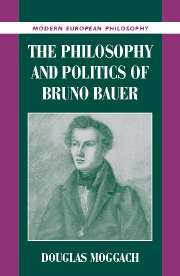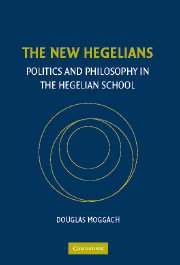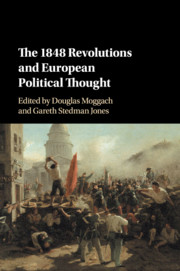The Philosophy and Politics of Bruno Bauer
This is a comprehensive study in English of Bruno Bauer, a leading Hegelian philosopher of the 1840s. Inspired by the philosophy of Hegel, Bauer led an intellectual revolution that influenced Marx and shaped modern secular humanism. In the process he offered a republican alternative to liberalism and socialism, criticized religious and political conservatism and set out the terms for the development of modern mass and industrial society. Based on in-depth archival research this book traces the emergence of republican political thought in Germany before the revolutions of 1848. Professor Moggach examines Bauer's republicanism and his concept of infinite self-consciousness. He also explores the more disturbing aspects of Bauer's critique of modernity, such as his anti-Semitism. This book will be eagerly sought out by professionals in political philosophy, political science and intellectual history.
- A study of major disciple of Hegel who shaped the thinking of Marx
- Cross-disciplinary interest especially in political philosophy, political science and history of ideas
Reviews & endorsements
"...well-researched, competent...masterful, Moggach's analysis is necessary reading for all interested in Hegel and Hegelian studies."
C.E. Butterworth, University of Maryland College Park, Choice
"A study of unprecedented analytical depth and a important addition to the literature."
Dialogue
"This book represents a major contribution to our understanding of Bruno Bauer and his place amongst fellow Young Hegelians such as D.F. Strauss, Arnold Ruge, Ludwig Feuerbach and, of course, Karl Marx. More than that, however, it offers an original and insightful interpretation of Bauer's republicanism, one that is grounded in an ethical and aesthetic critique of Hegel's late political philosophy."
Philosophy in Review, Samir Gandesha, Simon Fraser University
"Douglas Moggach has written the first comprehensive book in English dedicated to the philosophical reconstruction of Bauer's though from the late 1820s to his involvement in the revolution of 1848. This is a notable achievement."
European Journal of Philosophy
Product details
April 2003Hardback
9780521819770
304 pages
229 × 152 × 21 mm
0.62kg
Available
Table of Contents
- Preface
- Introduction: 'the friend of freedom'
- Part I. Foundations: Aesthetics, Ethics and Republicanism:
- 1. 'The idea is life': Bauer's aesthetics and political thought
- 2. 'Free means ethical': idealism, history and critical theory
- Part II. Judging the Old Order:
- 3. 'The other of itself': the critique of the religious consciousness
- 4. 'Revolution and the Republic': the state and self-consciousness
- Part III. The Emancipatory Project:
- 5. 'Only the ought is true': Hegel, self-consciousness and revolution
- 6. 'To the people belongs the future': universal right and history
- Part IV. Judging the Revolutionary Movement:
- 7. 'The fire of criticism': revolutionary dynamics, 1843–8
- 8. 'The republic of self-consciousness': revolutionary politics in 1848
- Epilogue: after the revolution: the conclusion of the Christian-Germanic age
- Appendix: Bruno Bauer, 'On the Principles of the Beautiful' (1829)
- Notes
- Bibliography
- Index.





